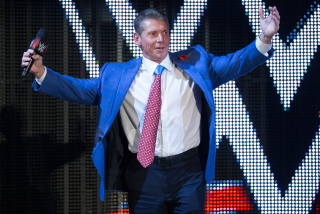Broadcaster and FCC Reach Settlement on Indecency Suit : Radio: Company that employs Howard Stern will pay $1.715 million but admits no wrongdoing or liability.
- Share via
In the largest settlement of its kind, the broadcasting company that employs radio personality Howard Stern will pay the federal government $1.715 million to resolve more than 100 claims of indecency involving Stern’s radio shows.
The settlement between the Federal Communications Commission and Infinity Broadcasting Corp. of New York will be paid to the U.S. Treasury and resolve all pending FCC action against Infinity. In addition, the station agreed to alert all on-air personnel to the federal law prohibiting the broadcast of indecent speech.
Infinity officials could not be reached for comment Friday. But in the news release announcing the settlement, Infinity said its payment to the Treasury is voluntary and that it is not admitting any wrongdoing or liability.
Although there have been several higher payments to the FCC involving telephone companies and other common carrier communications companies accused of wrongdoing, FCC Chairman Reed Hundt said the settlement with Infinity is the largest agreed to by a broadcaster.
The payment is an abrupt about-face from the aggressive stance Infinity has taken over the years in support of Stern, whose radio commentaries have been a big hit with listeners in New York, Los Angeles, Philadelphia, Washington and several other cities.
Since the company was first fined $6,000 in 1989, Infinity Broadcasting had bitterly battled every “notice of apparent liability” issued by the FCC, contending that the agency’s indecency rules were overly broad. The FCC ultimately levied a series of fines totaling $1.7 million against Infinity, but the agency has been deeply divided over whether and how to sanction Stern for on-air remarks that many consider far beyond the bounds of good taste.
The shock jock once said, for example, that he wanted to “strip and rape” male disc jockeys at a rival Los Angeles radio station. He also drew the ire of the FCC when he said he hoped that a cancer of the prostate would spread in a former head of the agency who was battling the disease.
But the lengthy federal examination of indecency complaints against Stern also had raised concerns about whether stiff financial penalties would have a chilling effect on broadcasters’ freedom of speech.
The Stern cases had been among more than 100 indecency cases pending at the FCC, a backlog caused in part by uncertainty over the FCC’s legal authority to punish offending broadcasters. But the U.S. Court of Appeals in Washington recently upheld the FCC indecency standards and procedures, clearing the way for the agency to resolve the cases.
More to Read
The biggest entertainment stories
Get our big stories about Hollywood, film, television, music, arts, culture and more right in your inbox as soon as they publish.
You may occasionally receive promotional content from the Los Angeles Times.










